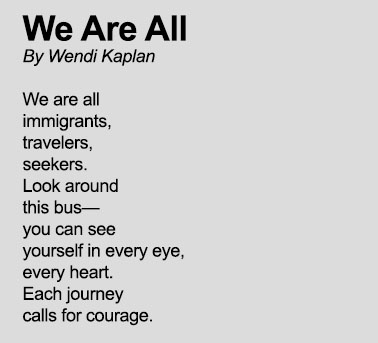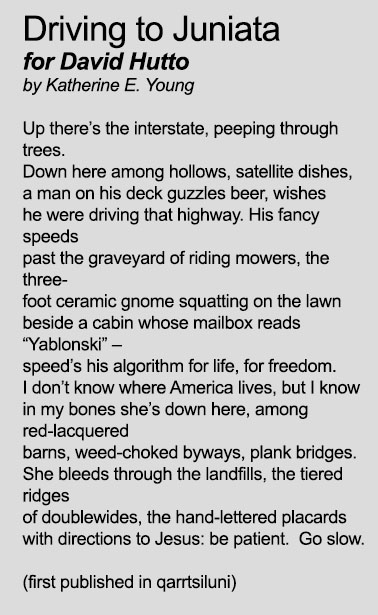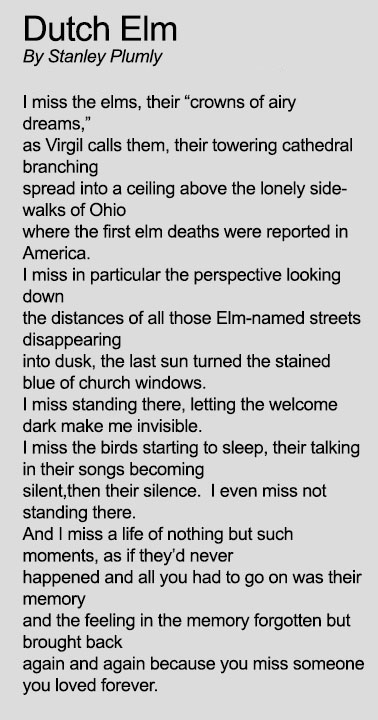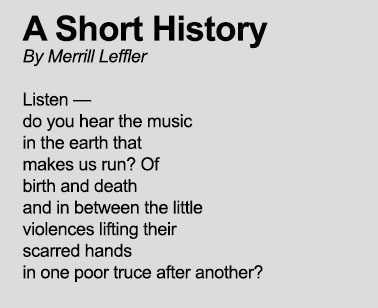Making sense of the world
Publisher’s note: Sometimes life sends us groping for answers. That’s generally true, for example, during our teenage years. But it’s also the case after the loss of a loved one or a personal setback.
We may also search for words when we’re moved by intense feelings for natural beauty. For example, see our travel story on the tiny paradise nation of Andorra.
But even in day-to-day life, especially when the world seems to be making less and less sense to us, we can benefit from stopping and listening to what’s around us — and to what’s inside of us — to hear what we’re saying to ourselves.
And it is at times like these, of course, that we turn to our local poet laureate for insights.
Our local poet laureate? Yes, Maryland, Virginia and the District of Columbia all have an official poet laureate — a talented writer tapped to draft meaningful poems for public occasions, and generally to promote listening to, reading and writing poetry throughout the community. So do Arlington and Alexandria, Va., and Takoma Park, Md.
D.C.’s poet laureate, Dolores Kendrick, passed away last year and has not yet been replaced. Prince George’s County and the city of Baltimore have youth poet laureates, age 14 to 19, who invigorate students’ interest in poetry, including rap.
In general, these poets see themselves as ambassadors for a sometimes overlooked art in a world of more prosaic texts and tweets.
The Beacon spoke with several local laureates as the Beacon Celebration of the Arts competition launches this month, which is also National Poetry Month.
See the box below this article for tips on writing and entering your poems in the competition.
 Wendi Kaplan, Alexandria, Va.
Wendi Kaplan, Alexandria, Va.
For Wendi Kaplan, Alexandria’s poet laureate, “Poetry is metaphor, which is the language of our soul…It reminds us of our humanity and brings us hope.”
Kaplan said her introduction to poetry began when she was a baby, with her mother reading her the works of A.A. Milne and later Edgar Allen Poe. She has been writing since she was a child, her poems often focusing on metaphors evoked by nature.
She is clinical social worker and certified poetry therapist who has worked in community services and has her own psychotherapy practice. She uses poetry in her practice and elsewhere because “it gives words so that voice can emerge and be heard. For those who feel marginalized, it brings the voice to center stage.”
Kaplan, 61, has taught at American University and at the George Washington University School of Medicine, and is now in the second of her three-year term as poet laureate.
She understands her role as poet laureate to be a practical one. “Poetry, in my thinking, is a bridge to yourself and to others…So I began my tenure with a task to build bridges in our community using poetry.
“I have had poetry readings where I invited young and old, diverse colors, religions and viewpoints to share their stories and thinkings via poetry.”
The readings are often built around specific themes, such as community, the environment, domestic violence, mental health and culture. Kaplan has read, listened to and created poetry in libraries and classrooms, in art galleries and in dance studios.
 Katherine E. Young, Arlington, Va.
Katherine E. Young, Arlington, Va.
Katherine Young, 55, who also translates Russian poetry and prose, is the city’s inaugural poet laureate.
“Rather than conferring the title as an honorific after a long and illustrious career, Arlington took a different tack,” she said. “They wanted a poet to be an advocate for literary arts…someone who could reach out in the community and build bridges that hadn’t existed before in supporting poetry.”
As such, in addition to sharing her poetry in schools and at readings, Young is working to integrate poetry into other community events, such as the Columbia Pike Blues Festival.
“I like to remind people that poetry is part of the fabric of civic life — not just poetry reading, which for many people is offputting. I like to interweave it into other facets of life,” she said.
Young sees a resurgence in interest in poetry in the Washington area, exemplified by the growing number of venues where poetry can be read and discussed. That includes the six area Busboys and Poets restaurants and the biennial national poetry festival Split this Rock, which will be held in Washington April 19-21. (See “Ways to Celebrate National Poetry Month
.”)
Part of the renewed interest in poetry has been recent political turmoil, according to Young. “Times when things go wrong, people call for poets. Poets [have been] energized by the election,” she said.
Young also sees the enormous popularity of the Broadway hit musical Hamilton and its more spoken style of rap as a sign that people are interested in engaging with the oral tradition of poetry.
Young’s advice for budding poets of any age is to not self-censor, and be open to sharing emotions.
“You have to somehow turn off that inner editor, those outside eyes. You have to say, ‘Whatever I do, it has to be real and come from the heart,’ and not be embarrassed,” she said.
“Try not to be a critic, try just to be a writer. If you want to write poetry, you have to read poetry. And not just on page, spoken word poetry as well.”
 Stanley Plumly, Maryland
Stanley Plumly, Maryland
Stanley Plumly, 78, founder of the Master of Fine Arts Program in Creative Writing at the University of Maryland, College Park, calls himself a “reluctant poet laureate.” The president of the University of Maryland asked Plumly if he would consider the post, “and I felt l owed him a favor,” he recalled half-jokingly.
Plumly has held the job since 2009 and has visited schools across the state.
“Students are fascinated by the thought that a grown man would devote his life to poetry,” he said. “It’s something they never really thought about.”
Although he has been at the University of Maryland for 30 years, Plumly has also taught at Princeton, Columbia, the University of Iowa, and the University of Michigan. He counts among his students former U.S. and Virginia Poet Laureate Rita Dove, and David Remnick, editor of The New Yorker.
Plumly started writing poetry as a teen in his native Ohio, “as much an act of innocence as necessity. You need to do it in order to come to terms with experiences that otherwise seem lost in chaos.
“The emotional focus and higher premium on language is what drew me to poetry, though I believe that imaginative prose can be no less demanding as an art.” To that end, Plumly has published three works of nonfiction as well as numerous poetry collections.
His Old Heart: Poems was a finalist for the National Book Award in 2007. In his 2013 collection, Orphan Hours, he reflects on his own cancer diagnosis and mortality. In Against Sunset, published in 2016, he addresses the theme of endings — from deaths of friends, to the close of the day.
His 2014 nonfiction book, The Legendary Dinner, imagines an evening 200 years ago spent with Romantic poets William Wordsworth and John Keats and essayist Charles Lamb. This summer, he will publish his latest nonfiction work, Elegy Landscapes, which explores the paintings of J.M.W. Turner and John Constable.
No matter how styles of poetry change over the centuries, its power endures, said Plumly, who lives in Frederick, Md.
“Poetry’s role is the same as it’s always been: to give depth and reality and truth to our common experience, in a language that moves us. Whatever its political or social or cultural implications, [they] are secondary or irrelevant to how it speaks to the heart.”
As for his own plans as a writer? “A poet never retires,” he said.
 Merrill Leffler, Takoma Park, Md.
Merrill Leffler, Takoma Park, Md.
Merrill Leffler has a degree in physics. After graduating in the early 1960s, he went to work at the NASA Langley Research Center in Hampton, Va.
He had hoped to join the newly inaugurated Peace Corps after college, but his father asked him to stay close to home instead because his mother had recently passed away. It was then that he started writing poetry.
After moving to the Washington area, he founded a literary magazine called Dryad, which evolved into the Dryad Press, which primarily publishes books of poetry.
Leffler, 77, also started a series of poetry readings at the Takoma Park Library. With his wife, fellow poet Ann Slayton, they created the library’s Spring for Poetry walk. Each spring, the event posts poems on the city’s streets by poets famous and less well known. The posters are illustrated by graphic design students from the Montgomery College School of Art and Design. The program is now in its 12th year.
As poet laureate since 2011, Leffler has written poems for citywide events, including a program honoring the late activist and mayor of Takoma Park Sam Abbott, and last year for a sanctuary city teach-in.
Leffler’s poems sometimes spring from his journal entries, and he recommends that new poets try writing down feelings, dreams or inspiration from a book or article they read.
“Over all these years, I haven’t sat down to write poems, but just to write in my journal. Every once in a while, that writing leads to my breaking the sentences into lines, into rhythms, and one word leads to another. That’s the beginning,” he said.
It may be days or weeks later that he returns to these entries and finds something that has enough importance to him that he shapes it into a poem.
“Poetry gives voice, often a concentrated intensity, to experience. Poems are there when we are in need….How often, in a time of crisis or pleasure, do we turn to a poem that we know or that we discover, and say, ‘Yes, that’s it!’” Leffler said of poetry’s power.
“As William Carlos Williams wrote, ‘It is difficult / to get the news from poems, / yet men die miserably every day / for lack / of what is found there.’”
Find your inner poet
Wendi Kaplan, poet laureate of Alexandria, Va. offers these suggestions for those who would like to try writing poetry or take it up again after a long break:
- Read poetry! Read old favorites and also read new poets to stretch yourself. Remember children’s poetry — these poems will speak to you too!
- Create the time to write — even if you feel you have nothing to say.
- Sit somewhere and observe. Write your observations, what you see and sense. Notice what you see, and then look again. Keep looking until you can actually see. Keep listening until you actually hear. Listen to leaves and rocks. Watch the wind.
- Observe yourself. What do you notice as you sit with yourself? What questions arise? What feelings and thoughts? How does your body speak?
- Listen to the voices within and put them on paper.
And then, if you care to share your poems with the world, you can enter up to three in the Beacon’s online Celebration of the Arts competition between April 2 and June 29. (Entry fee: $10/item.)
To enter the online competition, convert your poem to a pdf image and then to a jpg photo. Or print out your poem and take pictures of it with a digital camera or smartphone (use one photo per page).
Then go online to mdfedart.com/BeaconCelebration to register for the competition and upload your poem(s). Winners will be announced in August.
For questions about the process, call Roger King at the Beacon at (301) 949-9766.